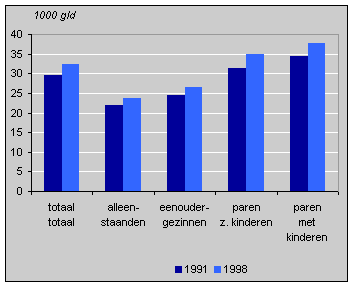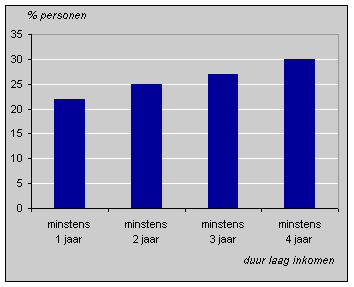Households say they need a higher minimum income

In 1998 Dutch households said that they needed at least an average 14,700 euros a year to make ends meet. This amount rose by just over 9% in the period 1991-1998. The average disposable household income in this period was in the region of 22,300 euros. Both incomes are corrected for inflation.
As single people have only themselves to provide for, they can get by on less money than a couple or a family. Indeed the amount single people say they need is lower than the amount couples say they need; and that of couples without children is in turn lower than that for couples with children. But for all these household types, the amount they say they needed rose between 1991 and 1998.
Minimum income households say they need

On the one hand households need more money because their recurring expenses have increased. After correction for inflation, households spent an average 900 euros more on things like rent, energy and insurance in 1997/'98 than in 1990/'91. In addition to this, however, their ideas about what constitutes the minimum basket of consumption goods too have changed. And so their ideas about the minimum amount of income they need have also changed.
One in ten Dutch households, that is just over 675,000 households, had less income than they said they at least needed in 1998. According to these households, they required about 20% more.
The higher its income is, the more the household thinks it needs. Low-income households required an average 11,000 euros income in 1998, nearly 4,500 euros less than households with an income above the low income limit. The latter said they needed at least 15,400 euros. This difference between the two groups remained fairly constant between 1991 and 1998.
Households which had received a low income for an extended period of time more often found it difficult to make ends meet. In 1998 nearly 22% of people who had received a low income for at least a year considered the income they received to be lower than the amount they needed to get by on. For people who had had such a low income for four years, this proportion was 30%.
Household income received lower than minimum considered necessary, 1998

Ger Linden